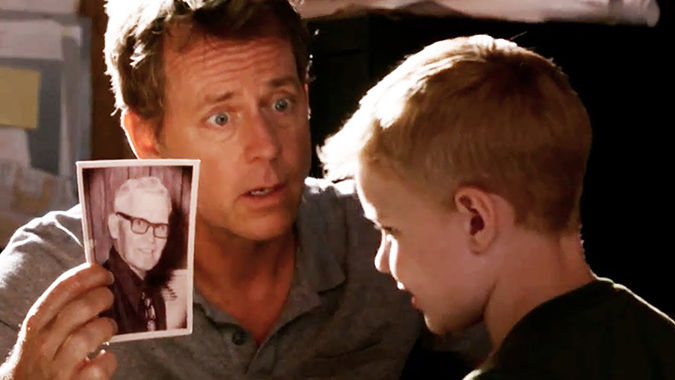In 2010, a small-town Nebraska preacher named Todd Burpo took the world by storm with the release of his book “Heaven Is For Real.” In it, Burpo claimed to detail the true story of what happened when his 4-year-old son Colton left his body during an emergency appendix surgery.
His son, Burpo wrote, visited heaven and returned. The book sold more than 10 million copies worldwide and has been translated into 35 languages.
In Hollywood, veteran movie producer Joe Roth decided the Burpos’ story was compelling enough to get behind. The result stars Oscar nominees Greg Kinnear and Thomas Haden Church and Emmy winner Margo Martindale. Oscar nominee Randall Wallace (“Braveheart”) directed and co-wrote the screenplay.
Such talent places the film version of “Heaven Is For Real” head and shoulders over most of the Christian-themed fare released by Hollywood in recent years, often with low budgets and mostly unknown actors. And amid a wave of recent Christian-themed hits including “Noah,” “God’s Not Dead,” and “Son of God,” and an Easter weekend at hand, “Heaven” stands a good chance of making this truly be the Year of Our Lord in theaters.
“Randy’s themes of love, honor, courage are in all his films, and if anyone could make this story accessible to the audience, I knew it would be him,” says Kinnear, speaking about the film in which he plays Todd Burpo on a recent Saturday at the Beverly Hilton Hotel.
“Love runs through this movie like water. It’s just there. Meeting Todd, one of the things I was taken by was his love for his children. And certainly to see him go through what he did and face what he did, we wanted to trace that relationship between him and Colton as best we could.”
Getting the tone of that core relationship right, while also clearly showing that Todd Burpo and his family were not uptight stereotypes, came from Wallace’s frequent conversations with Todd during the writing and filming of the screenplay. That personal attention to detail also served to make Kinnear confident that this was a project worth shooting, rather than poorly funded religious propaganda.
“I guess I might have agreed with plenty of folks a few months ago, but now it’s, ‘You’re doing another one of those movies?’ They’re definitely happening now, and whether it’s a trend or coincidence I just don’t know,” says Kinnear. “The subject matter to this movie is tricky. Even though heaven is in the title, the movie doesn’t over-serve with specifics of what heaven is like. It avoids that pitfall and tries to tell you this movie covers the events of this family as best as it can.”
Indeed, Wallace and his band of actors had to choose wisely regarding what they could show about Heaven, both due to the practical reasons of fitting an earthly budget and because dwelling for too long on the details of what Colton saw would knock the film’s dramatic elements off-balance. What remains in the final film is a vision of a glowing chapel with levitating angels floating in space, and a string of miraculous encounters with relatives that Colton never would have seen in the real world.
In fact, it’s those encounters that finally convinced Todd that his young son wasn’t crazy or inventing his stories about heaven. There were just too many facts he was sharing about people who had died well before he was born.
“He’s not a dumb guy, and no father wants to put his son in jeopardy but in going public with this story he was in choppy water doing that,” says Wallace about Todd Burpo. “Greg felt strong about the subject matter and that’s why he did it but I think he handled it honorably. It’s not like his son says everything you’ve been talking about is consistent with what I saw and Todd high-fives him back. I think it’s a very hopeful story as well, regardless of where you’re at on the faith spectrum and the movie does a very nice job of honestly giving you a front row seat to watch how this family dealt with these events.”
The Burpos have handled their newfound success well, by all accounts. While their church attendance boomed, requiring them to hire 13 staff members in addition to heavily funding several children’s programs, they have also tried to stay grounded in the roots of their usual daily lives.
And ultimately, it’s that universality that Wallace is hoping will prove to be the film’s strength with audiences.
“I told Joe Roth the movie was like ‘Field of Dreams’ or ‘The Sixth Sense,’ that I saw it in those terms and they loved that — not as a preachy movie but in the experience of seeing movies,” says Wallace. “I expected my church friends to like it but I intentionally invited atheist friends or Buddhists, and they were as moved as the Christians were and that to me was incredibly gratifying. They felt the doubts made it authentic, and they came out of the movie with a sense of joy and gratitude.”

